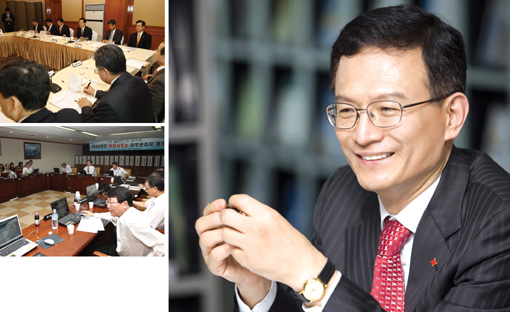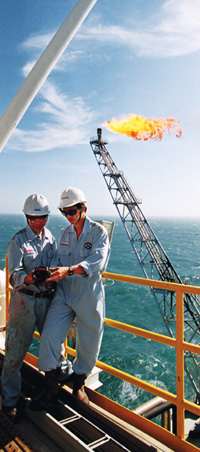KNOC Breaks the Mold
Under CEO Kang¡¯s strong leadership, KNOC is setting its sights on becoming a global oil major.

 Korea National Oil Corp. (KNOC) is accelerating its bid to reform itself with the goal of evolving into a world-class oil major. Spearheading efforts to advance KNOC to the global level is KNOC President and CEO Kang Young-won, who took the helm at the nation¡¯s petroleum exploration and production company in August 2008.
Korea National Oil Corp. (KNOC) is accelerating its bid to reform itself with the goal of evolving into a world-class oil major. Spearheading efforts to advance KNOC to the global level is KNOC President and CEO Kang Young-won, who took the helm at the nation¡¯s petroleum exploration and production company in August 2008.
Despite the public enterprise¡¯s innate nature of unwillingness to adapt to changes, KNOC¡¯s efforts to break the mold have paid off. Under Kang¡¯s leadership, KNOC executives and staff members have joined in drives to change the way it operates and have a new awareness toward the development of their company. Among the examples of the outcomes of the changes are the executives¡¯ and staff members¡¯ return of part of their compensation to create retirement consolation funds, the reduction of college graduates¡¯ starting pay by 12 percent and the disposal of some KNOC properties.
KNOC staff¡¯s changing perspective and improving organizational culture is owed to CEO Kang¡¯s intense passion and concentration into work, his focus on the mission of the development of the nation¡¯s petroleum exploration and production (E&P) company and cementing chemistry with his staff through ¡°kinship¡± meetings. Kang takes time to have free discussions with staff members from each department or each class or goes on hiking excursions together on Saturdays. The CEO makes calls with director- or lower-level officials to grasp business processes and hear feedback and complaints, while having dinners with staff members to obtain their honest opinions. He has reactivated monthly meetings to take stock of monthly business performances and convey management policies and pending issues as well as to help staff members find common ground and voluntarily participate in efforts to rectify practices. Management meetings that executives customarily attend have been expanded to include chiefs of divisions and offices in order to find common ground and share responsibility for management.
On the work front, CEO Kang is considered a workaholic. He has a tight business schedule from the early morning until the late night hours. He places priority on field management by touring branches in Korea and abroad even on Saturdays and Sundays. He has spent 84 days abroad while making overseas business trips to 23 countries on 17 occasions since his inauguration.
CEO Kang¡¯s management style ¡ª a fast, efficient decision-making attitude stemming from his career of working with the general trading company, Daewoo International for 33 years ¡ª has spread among staff members. KNOC¡¯s ubiquitous management based on a fast business process through communication via smartphones and notebook PC emails between the CEO and staff members has settled down. Writing brief reports with Word programs suitable for international business transactions are among the examples of companywide efforts to transform even trivial business processes to global standards.
CEO Kang is committed to doing his best in realizing a national mission: the development of both the national energy industry and KNOC. He understands that a task of making KNOC a world-class major amounts to be not only a mission considered to be prerequisite for the sustainable development of the national economy, but also a good opportunity to change KNOC¡¯s corporate paradigm into a new one and make a leap forward that could take the lead in ensuring national energy self-sufficiency. He has repeatedly stressed schemes to make KNOC a bigger, word-class petroleum company as key management tasks and activities he ought to perform.
In addition to its own management reform, KNOC is translating into action a plan to advance its management system in order to lay a growth foundation in attaining the so-called ¡°Great KNOC 3020¡± goal adopted early this year. The strategy calls for reaching the production of 300,000 barrels of oil per day and exploring deposits of 2 billion barrels with the goal of joining the ranks of top 50 oil majors by 2012. It also aims at expanding government petroleum stockpiling volumes to 141 million barrels in keeping with the government¡¯s plan to make Korea an oil hub of Northeast Asia, one of the government¡¯s top 100 tasks. The future plan also sets a target of advancing KNOC¡¯s management to global standards that could yield higher levels of achievements, create the most favored working conditions and establish the best work practice and systems.
The first task of the plan on the advancement of a management system is the realization of a Strategic Enterprise Management (SEM) system ¡ª ranging from target-setting to taking stock of execution and compensation ¡ª designed to achieve a target of raising production to four times the current level in four years.
In order to achieve the strategic targets, each headquarter, division, office and team have an existing target under review and an overall key performance indicator (KPI) under overhaul.
KNOC is set to have a performance and capacity-oriented compensation system in place, departing from the quasi-annual payment system. The new compensation system, to be finalized after consultation between management and labor, is to raise the employees¡¯ competiveness by essentially linking performance with compensation. The new compensation system, being arranged under a consultation service commissioned to the globally recognized consulting firms Wood Mackenzie and Accenture would double the differences in basic payments and expand the differences in annual performance payments from the current range of minus 65 percent to plus 65 percent to one of minus 300 percent to plus 300 percent ¡ª something that would be forecast to have great ripple effects in the compensation of public enterprises.
KNOC is implementing nine tasks under a strategic roadmap for petroleum development designed to evolve into a world-class E&P company. For instance, KNOC introduced a system to appoint an executive vice president in charge of petroleum development, expanded its petroleum research institution and adopted a specialist system for nurturing E&P manpower in which the human resources adviser and technical service head will be filled by foreign experts.
In a related development, the Ministry of Strategy and Finance has already announced a package of steps to nurture KNOC with the goal of joining the ranks of top 60 global oil companies by 2012. They include a plan to acquire petroleum mining blocks and E&P companies and one to invest 19 trillion won, including 4.1 trillion won in government budgets. If realized as planned, the MOSF expects Korea¡¯s own development rate to go up 7 percentage points to about 25 percent by 2012 from 18.1 percent set in the previous plan. nw
KNOC CEO Kang has devoted himself in carrying out the company¡¯s management reform. Kang took helm of the company in August 2008.
Officials of the Korea National Oil Corp. work on an oil prospecting ship in the 15-1 Block in southern Vietnam in which the Korean exploration and production company has a stake.
3Fl, 292-47, Shindang 6-dong, Chung-gu, Seoul, Korea 100-456
Tel : 82-2-2235-6114 / Fax : 82-2-2235-0799